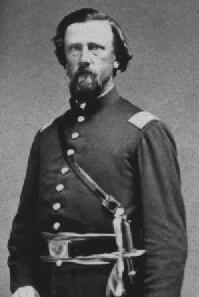Few events were as well documented by the soldiers of the 17th as their march north from Brooks Station, culminating in the Battle of Gettysburg. For those involved, the urgency of the northward movement is evident – they wrote of the grueling pace, the oppressive heat and humidity, of the dust and dirt. It was on this march that newly promoted Lt. Colonel Douglass Fowler (and commanding officer of the 17th due to the absence of Colonel Noble, recuperating at home from his Chancellorsville injuries) found himself under arrest on orders of division commander Francis Barlow. Fowler had violated Barlow’s strict marching orders and had allowed his men to fall out for water (or cherries, depending on who told the story). Even General Carl Shurz remembered the event in his description of Barlow:
“But they soon discovered him to be a strict disciplinarian, and one of the coolest and bravest in action. In both respects he was inclined to carry his virtues to excess. At the very time when he moved into the firing line at Gettysburg I had to interfere by positive order in favor of the commander of one of his regiments, whom he had suspended and sent to the rear for a mere unimportant peccadillo.”
The offender, of course, was Douglass Fowler. He would lose his life on July 1st on the knoll that would be known for the general who had him arrested.

